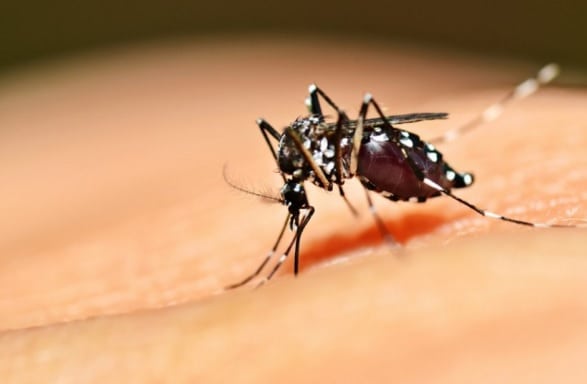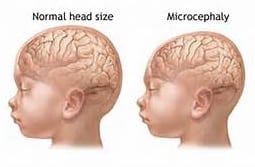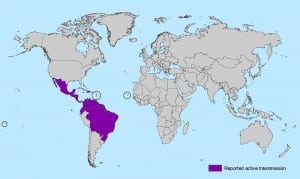News sources and the World Health Organization (WHO) have been warning the public about Zika and microcephaly, and parents and soon-to-be parents have become increasingly concerned about their personal health and the health of their families. Please note that the Zika virus does not cause microcephaly in infants or children that are already born. Experts believe that babies of individuals who contract the Zika virus during pregnancy may develop microcephaly in utero. Though there isn’t enough research to support this idea yet, researchers are increasingly convinced that there is a connection between Zika and microcephaly.
The Zika Virus
Mosquitos are Zika virus carriers. People become infected with Zika by mosquito bites. Symptoms are usually mild and include fever, rash, joint pain, and conjunctivitis (red eyes). The incubation period is likely to be a few days and symptoms last for 2-7 days. Severe cases may require hospitalization, though this is uncommon. There is no current vaccine to prevent infection and no current treatment.
According to the CDC, a May 2015 outbreak in Brazil “led to reports of Guillain-Barré syndrome and pregnant women giving birth to babies with birth defects and poor pregnancy outcomes.” Recently in Brazil, local health authorities have observed an increase in Zika virus infections in the general public as well as an increase in babies born with microcephaly in northeast Brazil. Some countries are even suggesting that no women should get pregnant until 2018.
A recent New York Times article about Zika includes statements by the WHO about the Zika virus. In a 2016 Geneva news conference, Dr. Margaret Chan, director-general of the WHO, declared the Zika situation “a public health emergency of international concern.” She said in her speech that, “experts agree that a causal relationship between the Zika infection during pregnancy and microcephaly is strongly suspected, though not yet scientifically proven. All agree on the urgent need to coordinate international efforts to investigate and understand this relationship better.”
Microcephaly
Microcephaly is an uncommon birth defect causing an infant’s head to be smaller than normal, leading to underdeveloped brains. This birth defect affects between 2 babies per 10,000 live births and 12 babies per 10,000 live births in the United States. The potential causes of microcephaly are exposures during pregnancy to certain infections, severe malnutrition, and exposure to alcohol, drugs, or toxic chemicals. However, researchers think that the Zika virus is also causing microcephaly. The problems related to microcephaly can range from mild to severe and are usually lifelong problems. In some severe cases, microcephaly can be life-threatening.
Problems in infants with microcephaly:
- Seizures
- Developmental delay (speech, milestones)
- Intellectual disability
- Movement and balance problems
- Feeding problems (i.e. swallowing)
- Hearing loss
- Vision problems
Microcephaly is diagnosed during pregnancy by ultrasound in the late 2nd trimester or early 3rd trimester. There is no known cure or treatment and babies with microcephaly may need life-long care and treatment (i.e. early intervention, speech, occupational, and physical therapies).
Travel Notices
Click over to the CDC to determine areas on high alert for Zika virus. If you are trying to get pregnant or are already pregnant, the CDC recommends avoiding travel to certain areas of the world. In fact, you should check the CDC travel website for any of your travels to determine necessary vaccines you may need before traveling.
See your healthcare provider in order to test your microcephaly if you are pregnant and develop a fever, rash, joint pain, or red eyes within two weeks after traveling to a country where Zika virus cases have been reported.
The WHO reported a recent confirmed case of Zika virus in the U.S. Virgin Islands. The woman was not pregnant and had not traveled in the three weeks before the onset of symptoms. There have also been six other cases of the Zika virus in the United States in the past three years. All six cases were in people who had contracted the Zika virus abroad. It is possible that the Zika virus will still travel to the mainland U.S., so it’s important to protect yourself and your family from mosquito bites.
Protect Against Mosquitos
The Aedes species of mosquitos are responsible for spreading Chikungunya, Dengue, and Zika. These species typically have small white stripes and bite during the daytime. Protect yourself against mosquitos in order to prevent possible contraction.
- Use insect repellent and reapply as needed
- Spray your clothing and gear with permethrin
- Use screens on all windows and doors (repair any holes)
- Use air conditioning
- Remove standing water
Items that hold water (buckets, tires, toys, pools, birdbaths, etc.) may be holding standing water. Empty and scrub any of these items, then cover them or throw them out.
Teach your kids more about infectious diseases by downloading the CDC’s free graphic novel – The Junior Disease Detectives: Operation Outbreak! For questions or comments, use the comment section of this blog or contact us at GHT.






